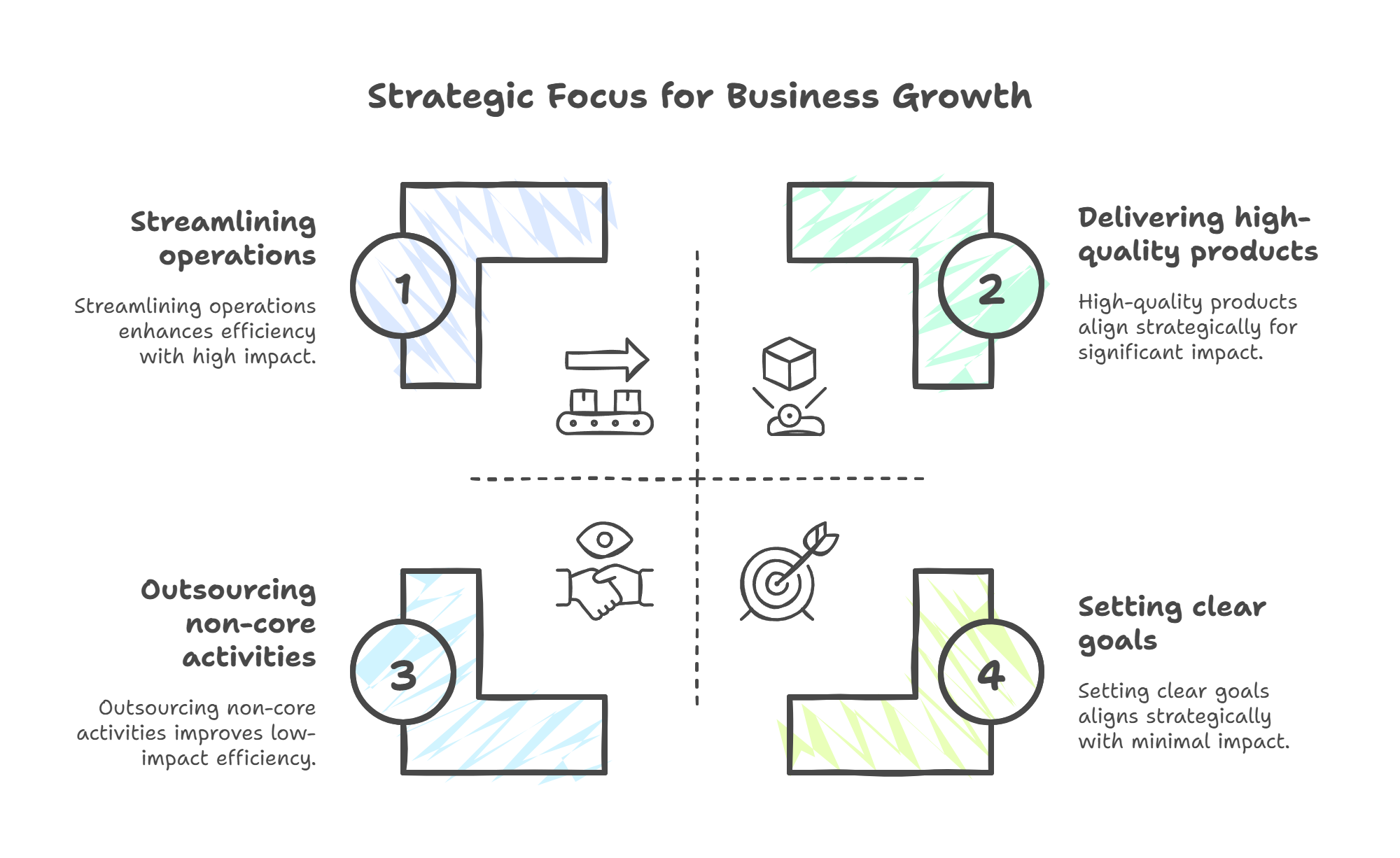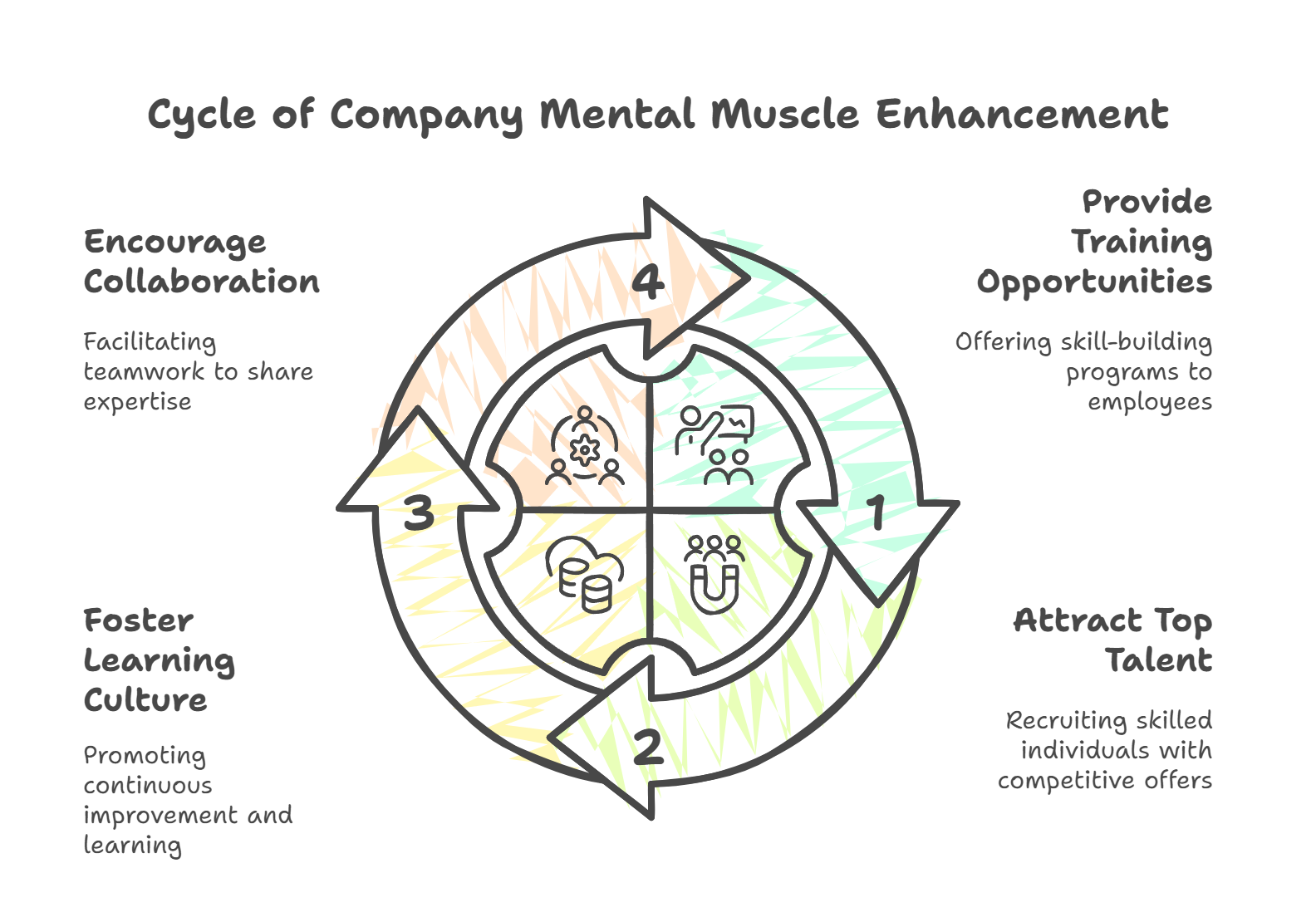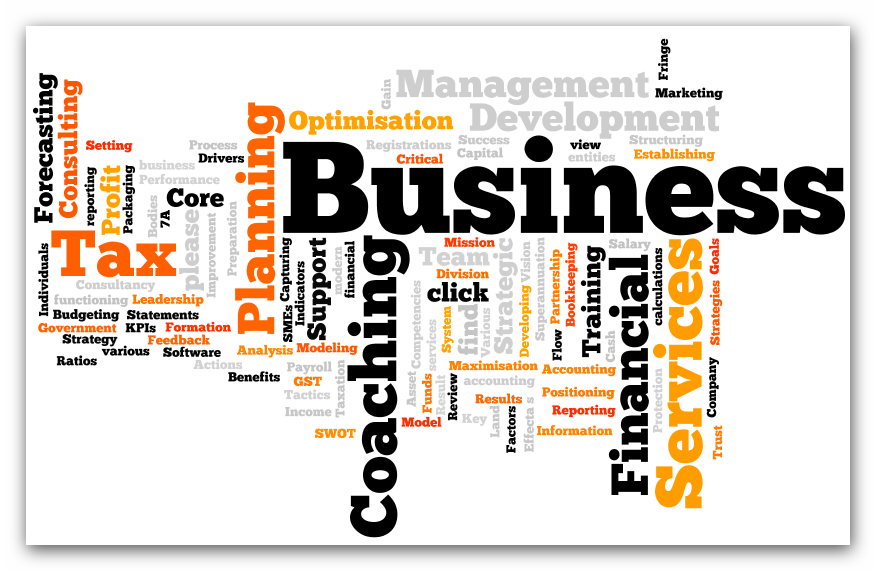From Morale to Management: Unpacking the 9Ms for Business Success
Companies must constantly analyse and improve their strategic capabilities to stay relevant in an overly competitive business world. Because business and the market are continually changing and shifting, customers’ tastes may change, strategic goals may become less clear, and a company’s position in the market may weaken. One practical approach to staying on top of things is to reassess and realign things that matter and that directly contribute to results. Strategists and managers doing this type of analysis perform a 9Ms business analysis. This analysis looks at nine key factors contributing to a company’s overall success (not in importance order): morale, money, movements in the market, “mores” (what the company currently does), market reputation, materials, machines, mental muscle, and management style.
Morale
The morale of a company’s employees can significantly impact its success. Employees who feel valued and engaged are more likely to be productive and motivated, which can help drive the company forward. Conversely, low morale can lead to decreased productivity, increased absenteeism, and higher turnover rates.
Employee turnover can be a significant problem for companies, often caused by poor leadership, a weak culture, and an unclear vision. Employees dissatisfied with their work environment may become disengaged, unproductive, or actively seek new job opportunities.
Strategies for Boosting Morale in the Workplace
One major factor that can contribute to employee turnover is poor leadership. Employees need to feel that they have a supportive, communicative, and competent manager. If their manager lacks these qualities, employees may feel disconnected and undervalued. They may also think their manager needs to understand their work or provide sufficient guidance, leading to frustration and demotivation.
Another factor that can contribute to employee turnover is a weak company culture. Employees want to work in a positive, inclusive, and supportive environment. Employees will likely feel demoralised and disengaged if the company culture is toxic, harmful, or unsupportive. They may also think that their values and priorities must align with the company’s, which can lead to a lack of commitment and loyalty.
Finally, unclear vision can also contribute to employee turnover. Employees want to work for a company with a clear purpose and direction. Employees may become confused or frustrated if the company’s vision needs to be clarified or constantly changed. They may feel that the company needs to provide more guidance or that their work needs to align with its goals. Uncertainty and confusion can lead to a lack of motivation and commitment and, ultimately, to employee turnover.
Companies must build strong leadership, create a positive company culture, and develop a clear and compelling vision to deal with these problems and keep employees from leaving. This can involve investing in leadership development programs, creating a more inclusive and supportive work environment, and communicating the company’s vision and values more clearly and consistently. By doing so, companies can help create a more engaged, motivated, and committed workforce, increasing productivity, higher job satisfaction, and reducing employee turnover.
To improve the morale of employees, companies can take several steps, such as:
- Providing opportunities for professional development and growth
- Offering competitive salaries and benefits
- Encouraging a positive work environment through open communication, recognition, and teamwork
- Offering a healthy work-life balance
- Fostering a sense of purpose and meaning in employees’ work
Money
Money is a critical factor in a company’s success, allowing it to invest in its operations, expand into new markets, and create new products and services. A company with vital financial resources is better equipped to withstand economic downturns and can take advantage of new opportunities as they arise.
The success of a business is often closely tied to its ability to expand and grow over time. However, to achieve this growth, businesses typically need access to funding and financial backing to achieve this growth. These resources are necessary for a company’s success rate to grow significantly.
Funding is crucial for businesses because it provides the resources needed to invest in growth opportunities. For example, companies may need to hire additional staff, invest in new equipment or technology, or expand their marketing efforts to reach new customers. These initiatives require significant financial resources, and businesses may need funding to pursue them effectively.
The Importance of Financial Backing for Business Expansion
In addition to providing growth resources, funding can help businesses manage risk and uncertainty. For example, companies may face unexpected expenses, changes in the competitive landscape, or shifts in consumer preferences that can impact their bottom line. With sufficient funding, businesses can better weather these challenges and continue to pursue their growth goals.
On the other hand, businesses that need more funding and financial backing may need help to achieve their growth goals. They may be forced to delay essential investments, limit their marketing efforts, or forego expansion opportunities altogether. This can make it challenging to remain competitive in the marketplace and may ultimately result in lower revenue and profits.
Furthermore, businesses that lack funding may also need to attract and retain top talent. With the resources to offer competitive salaries, benefits, and opportunities for advancement. Companies may find it easier to retain skilled employees. Weak motivation and unclear HR directions can lead to higher turnover rates, further eroding the business’s success.
With financial resources, businesses can remain competitive, pursue growth opportunities, and attract and retain top talent.
To improve the financial position of a company, companies can take several steps, such as:
- Reducing costs through operational efficiencies and cost-cutting measures
- Maximising revenue through effective pricing and sales strategies
- Seeking out new sources of funding, such as venture capital or loans
- Monitoring cash flow and maintaining a solid financial reserve
Movements in the Market
The market is constantly evolving, and companies need to be able to adapt to these changes to remain competitive. Companies can stay ahead by tracking industry trends, staying abreast of new technologies and innovations, and monitoring the competition.
In today’s fast-paced business environment, staying on top of industry trends and market adjustments is essential for success. Businesses that fail to adapt to these changes may experience strategic difficulties in reaching their objectives. This is particularly true in unregulated markets, where supply and demand fluctuate rapidly, and businesses must be agile and flexible to remain competitive.
One key reason businesses must stay up-to-date with industry trends and market adjustments is that it allows them to identify new growth opportunities. For example, emerging technologies or changing consumer preferences may create new markets or niches that businesses can leverage for growth. When you stay abreast of these trends, your team and the companies you run can position favourably to take advantage of the opportunities and achieve growth objectives.
Play to Win, Not to Spin
“Stop chasing ‘more’ in circles—play your strengths like a trump card and craft a lineup that owns your niche.
Live by the 80:20 law: amplify what you nail, offload the junk.
Obsess over quality, spark relentless innovation, and lock in processes that hum like a well-oiled engine.
With crystal-clear objectives lighting the way, you’re not just growing—you’re rewriting the game.”
Staying Ahead of Industry Trends and Market Adjustments
In addition to helping businesses find growth opportunities, keeping up with industry trends and changes in the market also helps them deal with risk and uncertainty. For example, changes in the competitive landscape or shifts in consumer preferences can impact a business’s bottom line. By monitoring these trends, companies can proactively adjust their strategies and mitigate the impact of these changes on their operations.
Businesses that don’t pay attention to industry trends and changes in the market may find it hard to reach their strategic goals. They may miss out on growth opportunities or need to adapt to changing market conditions, which can result in lost revenue and reduced profitability. Also, in unregulated markets, not responding to changes in supply and demand can lead to overproduction, underproduction, or missed chances to take advantage of changes in the market.
To improve a company’s ability to respond to market movements, companies can take several steps, such as:
- Conducting regular market research to stay up-to-date on industry trends and customer needs
- Establishing partnerships and strategic alliances with other companies to share resources and expertise
- Keeping an eye on the competition and adapting to changing market conditions
- Investing in new technologies and innovations to stay ahead of the curve
Mores (What the Company Currently Does)
The “MORE-s” of a company refer to its current practices and operations, which can significantly impact its overall success. “MORE-s” analysis is all about what the business/company should place as a strategic focus, like our core priority and doing more of it. It is also about the decision-making about what the business should stop doing.
Beyond Money: Why the 9Ms Matter for Long-Term Business Growth

Strategic Business Growth Focus
To improve the “more-s” of a company, companies can take several steps, such as:
- Focusing on strengths and unique capabilities and developing services and product mix that is the essence of its competitive position
- Focusing on core, following the 80:20 analysis, all the things we do well and abandoning or outsourcing everything that doesn’t fit the criteria
- Focusing on delivering high-quality products and services to customers
- Encouraging a culture of continuous improvement and innovation
- Implementing best practices and processes to streamline operations and increase efficiency
- Establishing clear goals and objectives for the company and its employees
Market Reputation
A company’s reputation in the market can significantly impact its success. A strong reputation can help to attract customers, build brand loyalty, and increase sales, while a negative reputation can have the opposite effect.
Companies with questionable or lousy reputations are unlikely to hold a leadership position in a market. Poor practices, services, and products are unlikely to result in financial windfalls and may ultimately result in lower revenue and profits.
A business’s reputation is essential because it can impact customer loyalty and retention. Customers are more likely to do business with a company with a positive reputation and a track record of delivering high-quality products and services. If a company has a weak reputation or a history of poor practices, customers may be reluctant to do business with them, resulting in lost revenue and reduced profitability.
The Impact of Reputation on Customer Loyalty and Retention
In addition to impacting customer loyalty and retention, a poor reputation can damage a company’s brand and image. A company’s brand is a critical asset that can help differentiate it from its competitors and attract new customers. If a company’s brand is tarnished by poor practices, services, or products, it can be challenging to repair the damage and regain customer trust.
Furthermore, a poor reputation can also impact a company’s ability to attract and retain top talent. Employees want to work for a company with a positive reputation and a strong culture. If a company has a good reputation or a history of poor practices, it may need help attracting and retaining skilled employees, impacting its ability to compete in the marketplace.
To improve a company’s market reputation, companies can take several steps, such as:
- Providing excellent customer service and ensuring customer satisfaction
- Building solid relationships with key stakeholders, including customers, suppliers, and partners
- Engaging in ethical and socially responsible practices
- Communicating openly and transparently with customers, stakeholders, and the public
- Investing in effective marketing and brand-building strategies to promote a positive image in the market
Materials
The materials a business uses to make goods and provide services can significantly affect its success. Companies must have access to high-quality, reliable materials to produce high-quality products and services that meet customer needs. During the recent supply chain disruptions caused by the global pandemic, businesses, to continue with operations, had to switch and supplement inputs with both substitutes and materials of questionable origin and quality. The price will be eventually paid.
One key reason the quality of inputs is so essential is that it can impact the quality and structure of the final output. For example, if a business uses low-quality materials or labour, the final product may be structurally unsound, not meet customer expectations, or even fail prematurely. This can result in lost revenue, negative customer reviews, and damage to the business’s reputation.
On the other hand, using reliable and high-quality materials and labour can guarantee that the final product’s craft and structure will meet customer expectations. This can result in higher customer satisfaction, positive reviews, and increased sales.
The Cost Savings of Investing in Quality Inputs
Furthermore, using reliable and high-quality materials and labour can also help businesses reduce costs in the long run. Although using high-quality materials and labour may be more expensive upfront, it can result in a higher-quality final product that requires less maintenance or repair over time. This can help businesses save money on repairs, replacements, and warranty claims.
On the other hand, using low-quality materials and labour can result in higher costs in the long run. Businesses may need to invest more money in maintenance, repair, or replace the product if it fails prematurely. This can result in higher costs, lost revenue, and damage to the business’s reputation.
To improve a company’s access to materials, companies can take several steps, such as:
- Building solid relationships with suppliers and seeking out new sources of materials
- Negotiating favourable terms and conditions with suppliers
- Investing in new technologies and innovations to improve the sourcing and procurement process
- Conducting regular assessments of material requirements and inventory levels to ensure that suitable materials are available when needed
Machines
The machines (technology) a company uses to produce its products and services can significantly impact its overall success. Technology is critical in determining a business’s competitiveness and production capacity in today’s business environment. With access to the latest technology advancements and practices, companies may stay caught up in delivering high-quality goods and services, ultimately affecting their competitive position.
One reason why technology is so important is that it can help businesses improve their efficiency and productivity. For example, automation technology can help enterprises to streamline their production processes and reduce the need for manual labour. This can result in faster production times, lower costs, and higher output levels, which can help businesses remain competitive in the marketplace.
In addition to improving efficiency and productivity, technology can help businesses improve the quality of their goods and services. For example, new software tools or hardware components may offer advanced features or capabilities to improve a product’s performance, reliability, or safety. Incorporate these technologies into your products, and watch how the businesses you run can enhance quality and meet customer expectations effectively.
The Importance of Technology for Business Competitiveness
Technology can also help businesses improve their customer service and engagement. For example, companies can use social media or other online platforms to interact with customers, respond to inquiries, and build stronger relationships. This can help businesses build brand loyalty, improve customer retention, and increase their competitive position.
Businesses that fail to invest in technology or keep up with the latest advancements may need help to remain competitive. They may have lower productivity levels, higher costs, and lower-quality output, leading to lost money and less profit.
Access to the latest Tech advancements and practices is essential for businesses looking to remain competitive and improve their production capacity. By investing in new technology tools and incorporating them into their operations, companies can improve efficiency, productivity, quality, customer service, and their competitive position in the marketplace.
To improve a company’s access to machines, companies can take several steps, such as:
- Investing in new technologies and innovations to improve production processes and increase efficiency
- Regularly maintaining and upgrading existing devices/machinery/production capacity to ensure optimal performance
- Seeking out new and innovative solutions to improve production processes
- Collaborating with suppliers and partners to access the latest technologies and innovations
Mental Muscle
A company’s mental muscle refers to its employees’ knowledge, skills, and expertise. To remain competitive and deliver high-quality products and services, companies must have a highly skilled and knowledgeable workforce.
One key reason a business’s mental muscle is so important is that it can impact the quality of work produced. For example, employees need to gain the necessary skills or knowledge to perform their jobs effectively to maintain the quality of work. This can lead to lost revenue, negative customer reviews, and damage to the business’s reputation.
On the other hand, when employees possess solid skills and knowledge, they can perform their job duties more effectively, resulting in higher-quality output and improved customer satisfaction. Additionally, when employees have a positive attitude towards work, they are more likely to approach their job responsibilities with enthusiasm and dedication, which can lead to higher levels of productivity and better results overall.
Why Employee Skills and Knowledge are Critical for Business Success
Furthermore, a business’s mental muscle can also impact its ability to innovate and adapt to changing market conditions. For example, the company may struggle to remain competitive if employees lack the necessary skills or knowledge to work with new technologies or implement new processes. Conversely, employees with strong skills and knowledge are better equipped to adapt to new challenges and take advantage of emerging opportunities.
On the other hand, if employees have a negative attitude towards work or are not motivated to improve their skills and knowledge, the business may need more motivation to achieve its objectives. This can result in lost revenue, decreased profitability, and an erosion of the business’s competitive position in the marketplace.

How to Improve Your Company’s Mental Muscle – The MM Blueprint
To improve a company’s mental muscle, companies can take several steps, such as:
- Providing training and development opportunities for employees to build their skills and knowledge
- Attracting and retaining top talent by offering competitive salaries and benefits
- Encouraging a culture of continuous learning and improvement
- Encouraging collaboration and teamwork to share knowledge and expertise across the company
Management Style
The management style of a company can have a significant impact on its overall success. Companies need strong, influential leaders to guide the company and make decisions that drive growth and success.
Management can have a significant impact on a business’s bottom line. When managers lack the necessary skills or fail to provide effective leadership, it can lead to decreased productivity, increased employee turnover, and reduced profitability.
What is the guaranteed way to decrease employee morale and motivation?
Employees who feel their manager needs to be more supportive, communicative, and competent may become disengaged or actively seek new job opportunities. This can result in lost productivity and increased costs associated with recruitment and training.
Furthermore, poor management can also result in decreased productivity and efficiency. For example, when managers need to provide clear guidance or set unrealistic expectations, employees may need help performing their duties effectively. This can result in lower-quality output, increased errors, and lower levels of customer satisfaction, which can ultimately impact the bottom line.
The Impact of Effective Leadership on Business Performance
On the other hand, effective leadership can help businesses improve their bottom line by fostering a positive work environment, increasing employee engagement and motivation, and improving productivity and efficiency. Influential leaders can provide clear guidance, communicate effectively with their employees, and create a culture of trust and support.
In addition to effective leadership, providing training opportunities is critical for maintaining employee morale and improving business performance. When employees have access to training opportunities, they can improve their skills and knowledge, ultimately resulting in higher-quality output and increased efficiency. This can help businesses improve their competitive position and achieve higher levels of profitability.
On the other hand, when employees need access to training opportunities, they may become frustrated or disengaged, which can impact their productivity and motivation. Additionally, businesses may need help to attract and retain skilled employees, which can ultimately affect the bottom line.
To improve a company’s management style, companies can take several steps, such as:
- Establishing clear goals and objectives for the company and its employees
- Encouraging open communication and collaboration between managers and employees
- Providing training and development opportunities for managers to build their leadership skills
- Promoting a culture of accountability and responsibility throughout the company
To sum up, the 9Ms analysis provides a comprehensive framework for assessing the strategic capabilities of a company. By analysing each of these factors, companies can identify areas for improvement and take action to enhance their overall success. Whether it’s improving morale, maximising financial resources, responding to market movements, or building mental muscle, there are many steps that companies can take to enhance their strategic position. With a focus on continuous improvement and a commitment to excellence, companies can stay ahead of the curve and achieve long-term success.



